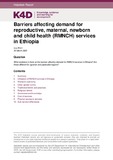| dc.contributor.author | Birch, Izzy | |
| dc.coverage.spatial | Ethiopia | en |
| dc.date.accessioned | 2020-04-24T08:32:21Z | |
| dc.date.available | 2020-04-24T08:32:21Z | |
| dc.date.issued | 2020-03-30 | |
| dc.identifier.citation | Birch, I. (2020). Barriers affecting demand for reproductive, maternal, newborn and child health (RMNCH) services in Ethiopia. K4D Helpdesk Report 797. Brighton, UK: Institute of Development Studies | en |
| dc.identifier.uri | https://opendocs.ids.ac.uk/opendocs/handle/20.500.12413/15251 | |
| dc.description.abstract | The main barriers affecting demand for reproductive, maternal, newborn and child health (RMNCH) services in Ethiopia are primarily associated with Women’s autonomy and other gender norms, Traditional beliefs and practices, Religious beliefs, Awareness and knowledge, Cost of services, and Physical access to services. The review finds that these barriers intersect. For example, men are more likely to get involved in decisions about the use of health services if there are significant financial implications, or consequences for the family as a whole; men’s decisions will also be shaped by their own personal beliefs. Women may have a high level of awareness about a particular service and its benefits, and know how to access it, but may still choose not to use it if that information is inconsistent with strong cultural beliefs, or their past experience of using the service. There is a significant body of literature on the topic, mostly academic studies with some grey literature, and generally standalone pieces of research, both quantitative and qualitative. The qualitative studies focus on specific locations, or particular aspects of RMNCH service provision. Less material was found that provides the comparative and systematic analysis required by the second half of the research question. The literature has a strong focus on gender, exploring both women’s and men’s perspectives and priorities, and some material that captures inter-generational views. No studies that address the relationship between RMNCH service provision and disability were found. | en |
| dc.language.iso | en | en |
| dc.publisher | IDS | en |
| dc.relation.ispartofseries | K4D Helpdesk Report;797 | |
| dc.rights.uri | https://www.nationalarchives.gov.uk/doc/open-government-licence/version/3/ | en |
| dc.subject | Children and Youth | en |
| dc.subject | Gender | en |
| dc.subject | Health | en |
| dc.subject | Rights | en |
| dc.title | Barriers Affecting Demand for Reproductive, Maternal, Newborn and Child Health (RMNCH) Services in Ethiopia | en |
| dc.type | Helpdesk | en |
| dc.rights.holder | © DFID - Crown copyright 2020 | en |
| rioxxterms.funder | Department for International Development, UK Government | en |
| rioxxterms.identifier.project | K4D | en |
| rioxxterms.version | VoR | en |
| rioxxterms.funder.project | 238a9fa4-fe4a-4380-996b-995f33607ba0 | en |

